Racism
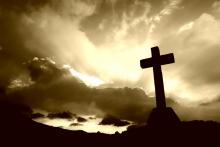
Summertime is "revival season" for Christians of various denominations. Traditionally revivals, or "Great Awakenings", have preceded most major movements in American society, like the Revolutionary War and the Civil War. Revival involves not only a supernatural outpouring of the Holy Spirit but an intense time of confession, repentance, and crying out to God to make us and our communities right.
This summer will mark two major Civil Rights anniversaries: the 50th Anniversary of the March on Washington and 58th Anniversary of Emmitt Till’s death. It is my belief that providence provides us with divine appointments that can be overlooked as coincidences if we do not have the spiritual eyes to see. This summer appears to be one of those times of divine appointment.
The American Church has never truly mourned and repented of its original sin of racism, and sadly this sin has infected the Body of Yahshua (Christ) globally.

When I was invited by the Drug Policy Alliance to participate in a pastors’ conference at the American Baptist College in Nashville on drug decriminalization, I didn’t know quite what to expect. In a room filled with African-American pastors, I felt like a fly on the wall of someone else’s family reunion. I began to see our criminal justice system, and our country, through different eyes.
I’ve reported on the conference elsewhere, but there I learned that while 13 percent of drug users are African-American, they account for 38 percent of drug arrests and 59 percent of drug convictions. Feeling disproportionately targeted, the pastors want drug usage to be treated as a health issue rather than a crime.
As the conference unfolded, it dawned on me that I, as part of the majority culture, perceive law enforcement in ways strikingly different from the way many African-Americans see it. I have always experienced American authorities as my protector. If the police pull me over for speeding, it is nothing more than an annoyance, and the ticket won’t break me. Though I’m no fan of traffic cameras and drones, for the most part the police are there to watch out for me, and they do. It has always been that way for my family, as we can trace our roots of privilege back to Northern Europe in the early 1500s. Those in charge are the good guys who protect us and our stuff.
But for these African-American pastor-friends of mine, it’s a different story.

THE METRO IS crowded today, and the 20-something, well-dressed white man has to stand, one hand holding the bar and the other his smartphone. It’s the end of the day. All the commuters—but one—are turned toward home. The young man’s face, like most of the others, is dulled with exhaustion. No one makes eye contact.
In a seat near the door, one woman sits facing everyone, looking backward. She studies the young man’s face intently, uncomfortably. He shifts. She rearranges the bags at her feet. Her reflection in the window shows an ashy neck above her oversized T-shirt collar. The train hums and clicks through a tunnel. As if in preparation, she takes another sip from the beat-up plastic cup she’s holding.
At last, she raises her voice and asks: “Why are white people so mean?” Boom! The electricity of America’s third rail crackles through the train. Faces fold in like origami or turn blank like a screensaver.
But this was no rhetorical question. When no one answers, she asks again, this time aiming her question at the young man with his phone. A flush creeps up his neck. “You look like you could be a sheriff,” she says to him. “Good and mean. I can see it in your eyes. You got mean eyes.” When he realizes her attention is stuck on him, he replies, “I hope I’m not mean. I try to be good.”

The brouhaha surrounding Paula Deen, the Food Network star accused of tolerating a racist atmosphere in the kitchen of one of her restaurants, has sent my scapegoat antennae vibrating. Folks are lining up on opposite sides of the issue, to either defend or condemn this Queen of a Southern cooking financial empire. Dropped by the Food Network, Smithfield Foods, and now Walmart, and with a Facebook page populated by supporters, Paula Deen’s accusers and defenders are facing off like battalions on a battlefield. Extreme polarization like this is a symptom that scapegoating is underway, so I suggest everyone take a deep breath and back away from the deep fat fryer while I offer a few scapegoating observations.
The Verdict is Already In
Polarization is not about a search for truth. Polarization indicates that each side believes it is in possession of the truth and is running on overdrive, panting with the effort of making their accusation stick. “Paula Deen is a racist!” shout her accusers. “Why do you hate Southerners?” counter her defenders. No matter which side you are on, you are steadfastly, undeniably certain that you are in the possession of the truth and on the side of good.
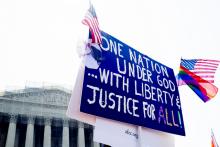
The words above the Supreme Court read, “Equal Justice Under the Law.” This week, two Supreme Court outcomes dramatically affected the reality of those words.
On Tuesday, in a 5-4 decision, a key component of the historic Voting Rights Act of 1965 was struck down, jeopardizing equal justice under the law especially for black, Hispanic, and low-income people whose voting rights have historically been assaulted and have continued to be suppressed as recently as the 2012 election. In fact, Section 4 of the Voting Rights Act — which required parts of the country that have been especially egregious in racially motivated voter suppression to get federal approval of any changes in their voting laws — was specifically used in the 2012 election to prevent new voter suppression. That provision has now been struck down, and efforts to increase barriers to voting are already underway in several states, especially in the South, that would suppress the future votes of Americans of color, especially those with lower incomes.
Equal justice under the law lost on Tuesday, June 25. The Supreme Court’s decision was morally shameful. ...
Contrast Tuesday’s decision with the final ones we saw handed down this week. ... I, along with a growing number of people in the faith community, believe that equal protection under the law is essential for our gay and lesbian friends and family members. While some Christians are conflicted about the theological issues involved, or even are unable to support homosexuality on a religious basis, they also don’t want churches to be the ones standing in the way of civil rights.
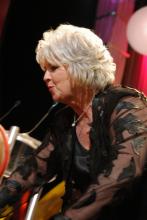
On Tuesday, the Supreme Court struck down part of the Voting Rights Act that was enacted in 1965 to root out racial discrimination in voting. The specific section of the Act that was stricken — Section 4 — set forth a formula for determining which jurisdictions need federal clearance before making even minor changes to voting procedures. The impact of striking Section 4 is that the most important part of the Act, Section 5, is now rendered useless. Section 5 provides that states, cities, and counties with a history of racial discrimination in voting must “pre-clear” changes to voting procedures with the Department of Justice or a special court in Washington, D.C. Without the formula in Section 4 to determine which states, cities, and counties the preclearance should apply to, the preemptive protection provided by Section 5 no longer exists, and any future challenges to changes in voting procedure must happen after such changes are already in effect.
The majority of the Court felt that racial minorities do not continue to face discriminatory voting practices, and that the preclearance requirement was based on 40-year-old facts that had no logical bearing on present day. Chief Justice Roberts, Jr., wrote:
“Our country has changed. While any racial discrimination in voting is too much, Congress must ensure that the legislation it passes to remedy that problem speaks to current conditions.”
The practical application of Tuesday's decision is that states will be able to enact potentially discriminatory laws that previously had been blocked. This was made immediately apparent in Texas, which announced after the ruling that voter identification laws would go into effect immediately.
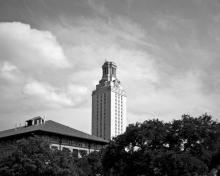
In a vote of 7-1 on Monday, the Supreme Court sent an affirmative action case, Fisher v. University of Texas, back to the lower court for a re-hearing, while reaffirming the benefits of diversity in institutions of higher learning and authorizing the continued use of race as one factor in admissions. By sending the case back to determine if the University of Texas could find no “available, workable race-neutral” alternatives available to them, Justice Ruth Bader Ginsberg explained the court did not issue a strong enough support for affirmative action. I agree. By virtue of our nation’s not-so-distant history, race simply is a factor that should be considered.
For nearly 250 years, blacks were bought and sold like cattle and carriages on auction blocks across America. When the Atlantic slave trade was outlawed in 1807, the U.S. bred slaves to reinforce the fundamental source of its wealth: free labor. When shackles fell from the wrists and legs of black men, women, and children — and the Reconstruction Era took hold — black families thrived and held public office. Then, for the next 80 years, thousands of white men in the South covered their faces with sheets, burned crosses, lynched 3,445 black men, women, and children, and instituted a web of laws that made it nearly impossible for blacks to vote, attain equal education, or own a home of much worth. At the same time in the North, blacks, Latinos, and Asians were redlined into urban ghettos where access to good housing, competitive education, adequate health care, effective law enforcement, and gainful employment was scarce.
When did this reign of terror against African-Americans end? The Civil Rights Act of 1964 and Voting Rights Act of 1965 outlawed so-called “Jim Crow” laws that had blocked blacks from voting and legally reinforced racial segregation. The acts laid the foundation for legal recourse against all manner of discrimination from that day to present.
Now consider this: We have made only two generations of progress after 17 generations of comprehensive, structural, systematized, and racialized oppression. And the effects of that oppression still haunt us today.
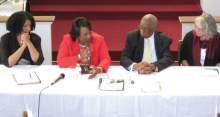
BERNICE KING watched as, one by one, the heads of denominations from across the nation bent down to sign the Christian Churches Together in the U.S.A. “Response to Dr. Martin Luther King Jr.’s ‘Letter from Birmingham Jail.’” Transfixed, King—Martin King’s daughter—sat in the first row of a church one block from Kelly Ingram Park, where 50 years before children had run scared, ravaged by German shepherds and fire hoses.
As they signed, the presidents of CCT’s five church “families” stepped to the podium. Each read his or her church family’s confession of complicity with the demons of racism and injustice during and since the civil rights era.
Fifty years ago, Martin Luther King Jr. sat behind bars in the Birmingham city jail and responded to criticism from eight local white clergy’s “Call for Unity” against outside agitators. King penned prophetic words in the margins of the newspaper that carried the white clergy’s call for “law and order and common sense.”
“Injustice anywhere is a threat to justice everywhere,” King explained. He recounted the failed attempts to negotiate with city officials hell-bent on living a “monologue rather than dialogue.” He clarified: “The purpose of our direct-action program is to create a situation so crisis-packed that it will inevitably open the door to negotiation.”

All were amazed and perplexed, saying to one another, ‘What does this mean?’
Acts 2.12 (NRSV)
Charles Ramsey, the African American male dishwasher who rescued Amanda Berry from captivity preached a transforming sermon when he shared his story about how he helped a Euro American woman in distress escape from 10-years of captivity. Ramsey boldly told the local television news reporter in Cleveland, “Bro, I knew something was wrong when a little pretty white girl ran into a black man’s arms.” And later when CNN’s Anderson Cooper asked Ramsey, how he felt about being a hero, Ramsey said, “No, no, no. Bro, I’m a Christian, an American. I am just like you. We bleed the same blood …”
Ramsey’s blunt honesty which spoke to the existence of racism and his sincere compassion for humanity was a 21st century mystification; a “radical real lived” theological symbol for the reason, why Christians celebrate Pentecost – the birth of the Holy Spirit and the historic beginning of the Christian Church. Biblical scholars teach us on the Day of Pentecost that a strong wind swept through a house where Jesus’ followers gathered days after he was resurrected from the dead. It was in the city of Jerusalem, where Jewish pilgrims gathered to celebrate Shavuot and people from other cultures who spoke diverse languages — believers and non believers of Jesus, heard about God’s powerful works in their native tongues and felt God’s holy presence.
When the day of Pentecost came, they were all together in one place. And suddenly from heaven there came a sound like the rush of a violent wind, and it filled the entire house where they were sitting. Divided tongues, as of fire, appeared among them, and a tongue rested on each of them. All of them were filled with the Holy Spirit and began to speak in other languages, as the Sprit gave them ability.

When Oklahoma voters overwhelmingly approved a 2010 ballot measure that prohibits state courts from considering Islamic law, or Shariah, the Council of American-Islamic Relations filed a lawsuit within two days challenging the constitutionality of the measure, and won.
But when Oklahoma Gov. Mary Fallin signed a similar measure, one that its sponsor said would forbid Shariah, on April 19 of this year, no legal challenges were mounted.
Why the change?
The biggest difference is that the older bill — and others like it — singled out Islam and Shariah, but also raised concerns that they could affect Catholic canon law or Jewish law. Many early anti-Shariah bills also made references to international or foreign law, which worried businesses that the new bills would undermine contracts and trade with foreign companies.
The new bills, however, are more vague and mention only foreign laws, with no references to Shariah or Islam. They also make specific exceptions for international trade. All of that makes them harder to challenge as a violation of religious freedom.
“These bills don’t have any real-world effect. Their only purpose is to allow people to vilify Islam,” said Corey Saylor, CAIR’s legislative affairs director, of the more recent bills.
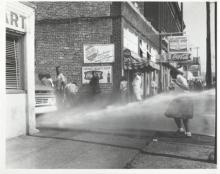
BIRMINGHAM, Ala. — In May 1963, thousands of Birmingham school children faced police dogs, fire hoses, and possible arrest to demonstrate against segregation. Now, 50 years later, those who were part of what became known as the “Children’s March” say they don’t want their story to be forgotten.
“We were doing this not just for ourselves but for some higher purpose,” said one of the young marchers, Freeman Hrabowski III. “It focused on civil rights for all Americans.”
Hrabowski is now president of the University of Maryland, Baltimore County. He was 12 when he marched in Birmingham and was arrested for parading without a permit. He and hundreds of other children were held in custody for five days before being released.
Experts say the children’s crusade helped galvanize the civil rights struggle at a time when efforts were flagging.
“That was really the tipping point in a tipping year,” Pulitzer Prize-winning author Taylor Branch, who has written a series of books about the civil rights movement, told the PBS program “Religion & Ethics NewsWeekly.”
Watch Birmingham and the Children’s March on PBS. See more from Religion & Ethics NewsWeekly.
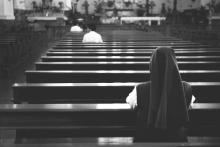
On March 31, 1968, a few short days before his assassination, Dr. Martin Luther King, Jr., preached at the National Cathedral in Washington, D.C.
He spoke a phrase he had used on a number of occasions and which by now, 45 years later, has gained a hard proverbial ring: "Eleven o'clock on Sunday morning is the most segregated hour of America."
The situation he described has stubbornly resisted any real movement, but the recent emergence of a radical theology dealing with violence itself is promising a crack in the walls that divide.
Black theologians such as James Cone and Kelly Brown Douglas have recognized the work of the theoretical anthropologist, René Girard. They consider it one of the few frameworks able to illuminate the nature of the violence suffered by the African-American community.
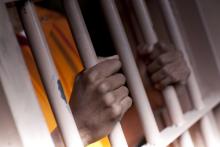
The United States has the highest incarceration rate in the world; one third of those incarcerated are serving long-term sentences for petty, non-violent crimes. One out of three African-American men will serve some sort of time under present law enforcement practices and the current criminal justice system. In Washington, D.C., that number jumps to an estimated three out of four. The United States imprisons a larger percentage of its black population than South Africa did at the height of apartheid.
More than 50 people gathered at Emmanuel Church of God in Christ in southeast Washington, D.C., on Sunday afternoon to hear the Rev. Louis Hutchinson remind them of these facts. Rev. Donnell Smith called the trend: “legalized discrimination.”
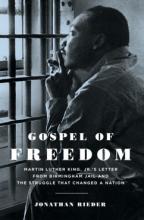
Fifty years after the Rev. Martin Luther King Jr. challenged white church leaders to confront racism, an ecumenical network has responded to his “Letter from Birmingham Jail.”
“We proclaim that, while our context today is different, the call is the same as in 1963 — for followers of Christ to stand together, to work together, and to struggle together for justice,” declared Christian Churches Together in the USA in a 20-page document.
The statement, which is linked to an April 14-15 ecumenical gathering in Birmingham, Ala., includes confessions from church bodies about their silence and slow pace in addressing racial injustice.
“The church must lead rather than follow in the march toward justice,” it says.
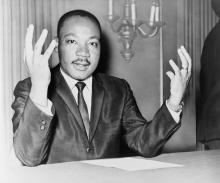
This August will mark the 50th anniversary of Martin Luther King’s “I Have a Dream” speech, and there will rightly be much remembrance and celebration of its place in American history. But there is another anniversary that our nation, and especially its Christians, would do well to acknowledge, investigate, and ruminate.
Forty-five years ago yesterday, Dr. King arrived in Memphis, Tenn., to support a sanitation workers’ strike seeking to unionize. He was assassinated the next day — the anniversary we today remember — and in a sad irony our nation began the sanitation of his legacy. Indeed, King’s decision to join the Memphis struggle was just one of many acts that clash with what David Sirota calls the “Santa Clausified” image of King that we pass to our youth.
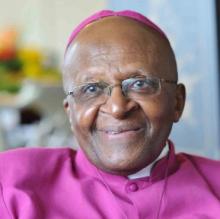
Desmond Tutu, the former Anglican archbishop of Cape Town, South Africa, who won a Nobel Peace Prize for his battle against apartheid, has won the 2013 Templeton Prize, which is billed as the most significant award in the field of spirituality and religion.
Tutu, who has not been afraid in recent years to criticize leaders in his country and across Africa for humanitarian and political shortfalls, was cited for his work in advancing the cause of peace and the spiritual principles of forgiveness.
“By embracing such universal concepts of the image of God within each person, Desmond Tutu also demonstrates how the innate humanity within each of us is intrinsically tied to the humanity between all peoples,” Dr. John M. Templeton, Jr., the president and chairman of the John Templeton Foundation, said in a video statement released Thursday announcing the $1.7 million award.
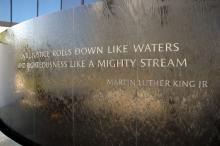
In January 2011, members of Christian Churches Together in the U.S.A. met in Birmingham, Ala., to examine issues of domestic poverty and racism through the lens of the civil rights movement and by reading together Martin Luther King Jr.'s "Letter from Birmingham Jail." As they gathered in the 16th Street Baptist Church under the beautiful Wales Window portraying the black Christ, which replaced the window blown out when the church was bombed in 1963, these contemporary church leaders, representing the broadest Christian fellowship in the country—36 national communions and seven national organizations, including Sojourners—realized that apparently no clergy had ever issued a response to King's famous letter, even though it was specifically addressed to "fellow clergymen [sic]." In 2013, to mark the 50th anniversary of King's letter, Christian Churches Together released its thoughtful response, which we excerpt below. —The Editors
WE CONFESS. As leaders of churches claimed by more than 100 million Americans; as Catholics, evangelicals, Pentecostals, Orthodox, Historic Protestants, and members of Historic Black denominations; as people of many races and cultures: We call ourselves, our institutions, and our members to repentance. We make this confession before God and offer it to all who have endured racism and injustice both within the church and in society.
As church leaders, we confess we have tended to emphasize our responsibility to obey the law while neglecting our equal moral obligation to change laws that are unjust in their substance or application. All too often, the political involvement of Christians has been guided by the pursuit of personal or group advantage rather than a biblically grounded moral compass. We confess it is too easy for those of us who are privileged to counsel others simply to "wait"—or to pass judgment that they deserve no better than what they already have.
We confess that we are slow to listen and give legitimacy to those whose experience of race relations and social privilege in America is different than our own. We keep the "other" at arm's length to avoid hearing the call to sacrifice on their behalf. Our reluctance to embrace our "inescapable network of mutuality" underscores Dr. King's observation that privileged groups seldom give up their advantages voluntarily. For example, it is difficult to persuade most suburban Christians to demand that they strive for the same quality of education in our cities that they take for granted in their own schools. To the extent that we do not listen in love, our influence in society is limited to "a weak, ineffectual voice with an uncertain sound."
It’s been 50 years since several significant events of the civil rights movement of the 1960s occurred, yet our society is still plagued with systemic racism. It’s been almost 150 years since we abolished slavery in this country, yet many are still enslaved daily by the oppression of discrimination and poverty. While significant strides in equality and justice have taken place, new systems of injustices have been instated and threaten the integrity of our much-stated rights of “life, liberty, and the pursuit of happiness.”
I am most presently thinking of the system of the “New Jim Crow,” something author and advocate Michelle Alexander has awakened society to with the recent publication of her book with that title. The New Jim Crowrefers to the web of injustices related to mass incarceration and the stripping of basic rights of returning citizens reminiscent of the Jim Crow laws of our nation’s history. Today, returning citizens face “legalized discrimination” from employers and landlords, making it extremely difficult for them to get a job or a place to live. Additionally, in many states they are not allowed to sit on a jury or express their right to vote, meaning their voices are stifled.

I walked down the newly plowed row with my grandpa, feeling the warm, red clay on the soles of my bare feet and listening to his stories and words of advice. I held a tomato plant in my hands, the rich, black potting soil falling off of the small, vulnerable roots, as he knelt and dug a place for it in the garden. “Hey,” he’d often start, “here's something my daddy told me when I was little. ‘God gave you two ears and one mouth because He wants you to listen twice as much as you speak. If you do that, you'll learn something. If you don't, you won't.’”
The memory of walking with my grandpa in his garden came back to me after I read about The Faith and Politics Institute's Civil Rights Pilgrimage in which more than 250 people (including 30 members of Congress) took a three-day tour of civil rights landmarks from Tuscaloosa to Birmingham to Montgomery to Selma. The participants in the pilgrimage got to hear the stories of the struggle for justice from the people who were in those places 50 years ago. I especially remember grandpa’s stories about his childhood on the family dairy farm in Greenville, S.C. in the 1920s. I liked to hear stories about the black folks who came and worked with him and his family. I heard hard work in his voice and saw struggle in his face when he talked about those times.
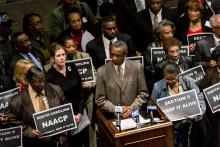
I was on the airplane, looking forward to reading Taylor Branch’s new book, The King Years: Historical Moments in the Civil Rights Movement. As I opened my Kindle, I realized that it offered large excerpts of Branch’s previous works, and was glad that while I have the other books in hard cover, I had these stories in my Kindle. But as I re-read some of the accounts, I realized that my 40-something-old self reacted differently than when I first read some of the accounts when I was 20-something. My younger self yearned to know: How did they organize? How did they deal with differing motives and different movements? And I yearned to believe that I, too, would have sacrificed my being for “The Movement.”
My late 40-something-old self read these words as a mother — as someone who understood the fury of the parents who were scared as their children sacrificed their very lives for justice’s sake.